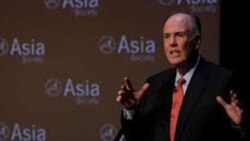“The future of the United States has never been more closely linked to the economic, strategic and political order emerging in the Asia-Pacific,” said U.S. National Security Advisor to the President Tom Donilon.
“Every Administration faces the challenge of ensuring that cascading crises do not crowd out the development of long-term strategies to deal with transcendent challenges and opportunities.”
“The United States is implementing a comprehensive, multidimensional strategy: strengthening alliances; deepening partnerships with emerging powers; building a stable, productive, and constructive relationship with China; empowering regional institutions; and helping to build a regional economic architecture that can sustain shared prosperity,” said Mr. Donilon.
First, alliances will continue to be strengthened. Our alliances in the region have been and will remain the foundation of our strategy. The U.S. alliances with Japan and the Republic of Korea remain a cornerstone of regional security and prosperity in the Asia-Pacific region. The United States is also forging even closer ties with Australia, and fully recognizes the growing importance of Southeast Asia, including allies Thailand and Philippines.
Second, we will deepen and widen our partnerships with emerging powers such as India and Indonesia. The United States is also building new relationships with countries like New Zealand and the Pacific Island states that reflect both historic ties and common values with Pacific nations.
The third pillar of U.S. strategy is building a constructive relationship with China. “The U.S.-China relationship has and will continue to have elements of both cooperation and competition. Our consistent policy has been to improve the quality and quantity of our cooperation; promote healthy economic competition; and manage disagreements to ensure that U.S. interests are protected and that universal rights and values are respected,” he said.
The fourth is to strengthen regional institutions, which reflects Asia’s need for economic, diplomatic and security-related rules and understandings.
The fifth is to build an economic structure that will allow the people of the Asia-Pacific to reap the rewards of greater trade and growth.
The Obama Administration has worked to make our rebalance to the Asia-Pacific a reality because the region’s success in the century ahead, and the United States’ security and prosperity in the 21st century, still depend on the presence and engagement of the United States in Asia. We are a resident Pacific power, resilient and indispensable. And in President Obama’s second term, this vital, dynamic region will continue to be a strategic priority.
“Every Administration faces the challenge of ensuring that cascading crises do not crowd out the development of long-term strategies to deal with transcendent challenges and opportunities.”
“The United States is implementing a comprehensive, multidimensional strategy: strengthening alliances; deepening partnerships with emerging powers; building a stable, productive, and constructive relationship with China; empowering regional institutions; and helping to build a regional economic architecture that can sustain shared prosperity,” said Mr. Donilon.
First, alliances will continue to be strengthened. Our alliances in the region have been and will remain the foundation of our strategy. The U.S. alliances with Japan and the Republic of Korea remain a cornerstone of regional security and prosperity in the Asia-Pacific region. The United States is also forging even closer ties with Australia, and fully recognizes the growing importance of Southeast Asia, including allies Thailand and Philippines.
Second, we will deepen and widen our partnerships with emerging powers such as India and Indonesia. The United States is also building new relationships with countries like New Zealand and the Pacific Island states that reflect both historic ties and common values with Pacific nations.
The third pillar of U.S. strategy is building a constructive relationship with China. “The U.S.-China relationship has and will continue to have elements of both cooperation and competition. Our consistent policy has been to improve the quality and quantity of our cooperation; promote healthy economic competition; and manage disagreements to ensure that U.S. interests are protected and that universal rights and values are respected,” he said.
The fourth is to strengthen regional institutions, which reflects Asia’s need for economic, diplomatic and security-related rules and understandings.
The fifth is to build an economic structure that will allow the people of the Asia-Pacific to reap the rewards of greater trade and growth.
The Obama Administration has worked to make our rebalance to the Asia-Pacific a reality because the region’s success in the century ahead, and the United States’ security and prosperity in the 21st century, still depend on the presence and engagement of the United States in Asia. We are a resident Pacific power, resilient and indispensable. And in President Obama’s second term, this vital, dynamic region will continue to be a strategic priority.






